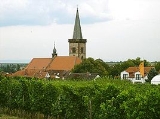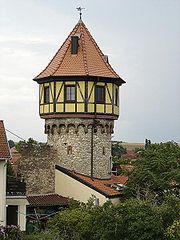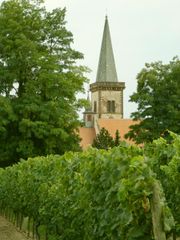
Worms-Pfeddersheim
Encyclopedia
The former free imperial city
Pfeddersheim (ˈpfɛdɐs.haɪm; ˈpedɛʒm) is a borough of Worms
since 1969. It became a borough after 2,000 years of independent history.
Pfeddersheim is located in the Pfrimm
valley in Rhenish Hesse and surrounded by Riesling
vineyards. The well-preserved defensive towers and wall are tourist attractions, as are the synagogue
and the Lutheran-Catholic Simultankirche (a church which contains a Lutheran and a Catholic
church in one building). The village also has a school museum.
times, as archaeological evidence suggests. Its modern name is derived from the Latin
Paternus. Pfeddersheim was owned by the Frankish
kings from the 5th century onwards. They developed the village and it was given town privileges
at around 1300 by King Albert I of Habsburg
. The town became so rich and important that it became a member of the Rhenish City-League in 1381, like the cities of Frankfurt
, Mainz
, Strasburg
and Worms. This freedom lasted only for a short while and Pfeddersheim came under the control of the Electoral Palatinate in 1465.
Several fierce battles were fought in the vicinity of Pfeddersheim. The German Peasants' War
was crushed here on 23/24 June 1525, after the citizens of Pfeddersheim showed solidarity with the peasants. Thousands of peasants and citizens were killed in the Battle of Pfeddersheim. Pfeddersheim surrendered, together with Worms, to Louis V, Count Palatine of the Rhine
and became protestant, as did many regions in today's Rhineland-Palatinate
. Pfeddersheim never recovered from the destructions in the Thirty Years' War
and especially the War of the Palatine Succession and remained a small town after 1689.
Pfeddersheim became the capital of a canton of 24 villages in the département Mont-Tonnerre
during the French occupation of the left bank of the Rhine in the Napoleonic Empire
. In 1815 it became part of the Grand Duchy of Hesse
. In 1874 it lost its town privileges, because it did not have enough citizens. It was granted these privileges again in 1954 by the new state Rhineland-Palatinate (in time for the 1200th anniversary of the founding of Pfeddersheim). It lost its town privileges again in 1969, when it was made a borough of Worms, despite a court challenge in the administrative court at Koblenz.
The local football team TSG Pfeddersheim is known in the region since it played in the Oberliga Südwest
from 1992 to 2000 and missed promotion to the Regionalliga West/Südwest
in 1996.
Pfeddersheim has a public outdoor swimming pool.
– Bingen
). Trains stop here every 30mins and every hour at weekends. The borough is connected to Worms by public transport.
Pfeddersheim lies on the B 47 and near the exit Worms of the A 61
. The A 61 spans the valley of the Pfrimm east of Pfeddersheim.
|  |
|  >
>
Free Imperial City
In the Holy Roman Empire, a free imperial city was a city formally ruled by the emperor only — as opposed to the majority of cities in the Empire, which were governed by one of the many princes of the Empire, such as dukes or prince-bishops...
Pfeddersheim (ˈpfɛdɐs.haɪm; ˈpedɛʒm) is a borough of Worms
Worms, Germany
Worms is a city in Rhineland-Palatinate, Germany, on the Rhine River. At the end of 2004, it had 85,829 inhabitants.Established by the Celts, who called it Borbetomagus, Worms today remains embattled with the cities Trier and Cologne over the title of "Oldest City in Germany." Worms is the only...
since 1969. It became a borough after 2,000 years of independent history.
Pfeddersheim is located in the Pfrimm
Pfrimm
The Pfrimm is a 42.7 km long, left or western tributary of the Rhine in the Rhineland-Palatinate .- Course :The Pfrimm rises in the southern part of the Donnersbergkreis. Its spring lies in the northern part of the Palatinate Forest Nature Park, about 3 km southeast of the municipality Sippersfeld...
valley in Rhenish Hesse and surrounded by Riesling
Riesling
Riesling is a white grape variety which originated in the Rhine region of Germany. Riesling is an aromatic grape variety displaying flowery, almost perfumed, aromas as well as high acidity. It is used to make dry, semi-sweet, sweet and sparkling white wines. Riesling wines are usually varietally...
vineyards. The well-preserved defensive towers and wall are tourist attractions, as are the synagogue
Synagogue
A synagogue is a Jewish house of prayer. This use of the Greek term synagogue originates in the Septuagint where it sometimes translates the Hebrew word for assembly, kahal...
and the Lutheran-Catholic Simultankirche (a church which contains a Lutheran and a Catholic
Roman Catholic Church
The Catholic Church, also known as the Roman Catholic Church, is the world's largest Christian church, with over a billion members. Led by the Pope, it defines its mission as spreading the gospel of Jesus Christ, administering the sacraments and exercising charity...
church in one building). The village also has a school museum.
History
Pfeddersheim was first mentioned in 754, the area was however occupied from RomanAncient Rome
Ancient Rome was a thriving civilization that grew on the Italian Peninsula as early as the 8th century BC. Located along the Mediterranean Sea and centered on the city of Rome, it expanded to one of the largest empires in the ancient world....
times, as archaeological evidence suggests. Its modern name is derived from the Latin
Latin
Latin is an Italic language originally spoken in Latium and Ancient Rome. It, along with most European languages, is a descendant of the ancient Proto-Indo-European language. Although it is considered a dead language, a number of scholars and members of the Christian clergy speak it fluently, and...
Paternus. Pfeddersheim was owned by the Frankish
Franks
The Franks were a confederation of Germanic tribes first attested in the third century AD as living north and east of the Lower Rhine River. From the third to fifth centuries some Franks raided Roman territory while other Franks joined the Roman troops in Gaul. Only the Salian Franks formed a...
kings from the 5th century onwards. They developed the village and it was given town privileges
Town privileges
Town privileges or city rights were important features of European towns during most of the second millennium.Judicially, a town was distinguished from the surrounding land by means of a charter from the ruling monarch that defined its privileges and laws. Common privileges were related to trading...
at around 1300 by King Albert I of Habsburg
Albert I of Germany
Albert I of Habsburg was King of the Romans and Duke of Austria, the eldest son of German King Rudolph I of Habsburg and his first wife Gertrude of Hohenburg.-Life:...
. The town became so rich and important that it became a member of the Rhenish City-League in 1381, like the cities of Frankfurt
Frankfurt
Frankfurt am Main , commonly known simply as Frankfurt, is the largest city in the German state of Hesse and the fifth-largest city in Germany, with a 2010 population of 688,249. The urban area had an estimated population of 2,300,000 in 2010...
, Mainz
Mainz
Mainz under the Holy Roman Empire, and previously was a Roman fort city which commanded the west bank of the Rhine and formed part of the northernmost frontier of the Roman Empire...
, Strasburg
Strasbourg
Strasbourg is the capital and principal city of the Alsace region in eastern France and is the official seat of the European Parliament. Located close to the border with Germany, it is the capital of the Bas-Rhin département. The city and the region of Alsace are historically German-speaking,...
and Worms. This freedom lasted only for a short while and Pfeddersheim came under the control of the Electoral Palatinate in 1465.
Several fierce battles were fought in the vicinity of Pfeddersheim. The German Peasants' War
German Peasants' War
The German Peasants' War or Great Peasants' Revolt was a widespread popular revolt in the German-speaking areas of Central Europe, 1524–1526. At its height in the spring and summer of 1525, the conflict involved an estimated 300,000 peasants: contemporary estimates put the dead at 100,000...
was crushed here on 23/24 June 1525, after the citizens of Pfeddersheim showed solidarity with the peasants. Thousands of peasants and citizens were killed in the Battle of Pfeddersheim. Pfeddersheim surrendered, together with Worms, to Louis V, Count Palatine of the Rhine
Louis V, Elector Palatine
Louis V, Count Palatine of the Rhine ; a member of the Wittelsbach dynasty was prince elector of the Palatinate....
and became protestant, as did many regions in today's Rhineland-Palatinate
Rhineland-Palatinate
Rhineland-Palatinate is one of the 16 states of the Federal Republic of Germany. It has an area of and about four million inhabitants. The capital is Mainz. English speakers also commonly refer to the state by its German name, Rheinland-Pfalz ....
. Pfeddersheim never recovered from the destructions in the Thirty Years' War
Thirty Years' War
The Thirty Years' War was fought primarily in what is now Germany, and at various points involved most countries in Europe. It was one of the most destructive conflicts in European history....
and especially the War of the Palatine Succession and remained a small town after 1689.
Pfeddersheim became the capital of a canton of 24 villages in the département Mont-Tonnerre
Mont-Tonnerre
Mont-Tonnerre is the name of a département of the First French Empire in present Germany. It is named after the highest point in the Rhenish Palatinate, the Donnersberg. It was the southernmost of four départements formed in 1798, when the west bank of the Rhine was annexed by France...
during the French occupation of the left bank of the Rhine in the Napoleonic Empire
First French Empire
The First French Empire , also known as the Greater French Empire or Napoleonic Empire, was the empire of Napoleon I of France...
. In 1815 it became part of the Grand Duchy of Hesse
Grand Duchy of Hesse
The Grand Duchy of Hesse and by Rhine , or, between 1806 and 1816, Grand Duchy of Hesse —as it was also known after 1816—was a member state of the German Confederation from 1806, when the Landgraviate of Hesse-Darmstadt was elevated to a Grand Duchy, until 1918, when all the German...
. In 1874 it lost its town privileges, because it did not have enough citizens. It was granted these privileges again in 1954 by the new state Rhineland-Palatinate (in time for the 1200th anniversary of the founding of Pfeddersheim). It lost its town privileges again in 1969, when it was made a borough of Worms, despite a court challenge in the administrative court at Koblenz.
Pfeddersheim today
Pfeddersheim has celebrated the 1250th anniversary of its foundation. The yearly celebrations of Pfeddersheim are the Pfeddersheimer Markt (lit. Pfeddersheim's Market), a yearly funfair and the Pfeddersheimer Weinbrunnen (lit. Pfeddersheim's Wine fountain), a yearly wine fest.The local football team TSG Pfeddersheim is known in the region since it played in the Oberliga Südwest
Oberliga Südwest
The Oberliga Südwest is the highest regional football league for the Rhineland-Palatinate and Saarland state of Germany. It is the fifth tier of the German football league system. It is one of eleven Oberligas in German Football, the 5th tier of the German football league system...
from 1992 to 2000 and missed promotion to the Regionalliga West/Südwest
Regionalliga West/Südwest
The Regionalliga West/Südwest was the third tier of the German football league system in the states of Saarland, Rheinland-Pfalz and Nordrhein-Westfalen from 1994 to 2000.- Overview :...
in 1996.
Pfeddersheim has a public outdoor swimming pool.
Transportation
The train station of Pfeddersheim lies on the Rhenish Hesse line (Worms – AlzeyAlzey
Alzey is a Verband-free town – one belonging to no Verbandsgemeinde – in the Alzey-Worms district in Rhineland-Palatinate, Germany. It is the fourth-largest town in Rhenish Hesse, after Mainz, Worms, and Bingen....
– Bingen
Bingen (Rhein) Hauptbahnhof
is the Hauptbahnhof of the German city Bingen am Rhein on the West Rhine Railway. Contrary to its name, it is not located in the city centre, but in the borough of Bingerbrück...
). Trains stop here every 30mins and every hour at weekends. The borough is connected to Worms by public transport.
Pfeddersheim lies on the B 47 and near the exit Worms of the A 61
Bundesautobahn 61
is an autobahn in Germany that connects the border to the Netherlands near Venlo in the northwest to the interchange with A 6 near Hockenheim. In 1965, this required a re-design of the Hockenheimring....
. The A 61 spans the valley of the Pfrimm east of Pfeddersheim.
External links
- Official Homepage Pfeddersheim
- Jürgen Pfitzner: History of Pfeddersheim from the Festschrift for the 1250 Years Pfeddersheim celebrations
- Reformation history in the archive of Rhineland-Palatinate
Pictures



